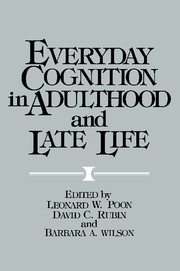Book contents
- Frontmatter
- Contents
- List of contributors
- Preface
- Part I Adult cognitive abilities in the laboratory and in real-life settings: Basic theoretical and methodological issues
- Part IA Systematic approaches to laboratory and real-world research
- Part IB Combining laboratory and real-world research
- Part II Cognition in adulthood and late life: Findings in real-life settings
- Part IIA Everyday cognitive abilities
- 11 Memory for prose: Perspectives on the reader
- 12 Prose processing in adulthood: The text, the reader, and the task
- 13 Speech comprehension and memory through adulthood: The roles of time and strategy
- 14 The effects of aging on perceived and generated memories
- 15 Aging and word retrieval: Naturalistic, clinical, and laboratory data
- 16 Acquisition and utilization of spatial information by elderly adults: Implications for day-to-day situations
- 17 Inner-city decay? Age changes in structure and process in recall of familiar topographical information
- 18 The cognitive ecology of problem solving
- 19 Everyday problem solving: Methodological issues, research findings, and a model
- 20 Prospective/intentional memory and aging: Memory as adaptive action
- Part IIB Concomitant influences
- Part III Cognitive enhancement and aging: Clinical and educational applications
- Part IIIA Issues and perspectives
- Part IIIB Enhancement approaches
- Part IIIC Designing programs for cognitive rehabilitation
- Subject index
- Author index
14 - The effects of aging on perceived and generated memories
Published online by Cambridge University Press: 05 October 2013
- Frontmatter
- Contents
- List of contributors
- Preface
- Part I Adult cognitive abilities in the laboratory and in real-life settings: Basic theoretical and methodological issues
- Part IA Systematic approaches to laboratory and real-world research
- Part IB Combining laboratory and real-world research
- Part II Cognition in adulthood and late life: Findings in real-life settings
- Part IIA Everyday cognitive abilities
- 11 Memory for prose: Perspectives on the reader
- 12 Prose processing in adulthood: The text, the reader, and the task
- 13 Speech comprehension and memory through adulthood: The roles of time and strategy
- 14 The effects of aging on perceived and generated memories
- 15 Aging and word retrieval: Naturalistic, clinical, and laboratory data
- 16 Acquisition and utilization of spatial information by elderly adults: Implications for day-to-day situations
- 17 Inner-city decay? Age changes in structure and process in recall of familiar topographical information
- 18 The cognitive ecology of problem solving
- 19 Everyday problem solving: Methodological issues, research findings, and a model
- 20 Prospective/intentional memory and aging: Memory as adaptive action
- Part IIB Concomitant influences
- Part III Cognitive enhancement and aging: Clinical and educational applications
- Part IIIA Issues and perspectives
- Part IIIB Enhancement approaches
- Part IIIC Designing programs for cognitive rehabilitation
- Subject index
- Author index
Summary
The origins of memories
Chapters 11, 12, and 13 are concerned with age differences in memory for spoken and written information and focus mainly on the processes of encoding and comprehension. This chapter is concerned with the nature of the memory representation and with wider issues arising out of the distinction between perceived and generated memories. This distinction applies to memory for all kinds of information, including scenes, events, and actions as well as discourse.
However, many memories are for things that never happened. This statement seems paradoxical because we tend to assume that memory representations originate from perceived events. We overlook the fact that memories may also be for events that never actually occurred, but have only been thought of or dreamed about. They may be memories of actions that were never performed, but only planned, considered, or intended. They may be memories of words that were never heard or read, but only imagined or inferred. The distinction between externally derived memories that originate from perceptions and internally derived self-generated memories is not always clear-cut. According to current cognitive theories, the sensory information derived from external events is interpreted, elaborated, or transformed by the application of stored prior knowledge and rules. So a perceived memory representation is a joint product comprising some elements that originated internally and some elements that originated externally.
- Type
- Chapter
- Information
- Everyday Cognition in Adulthood and Late Life , pp. 222 - 243Publisher: Cambridge University PressPrint publication year: 1989
- 3
- Cited by



